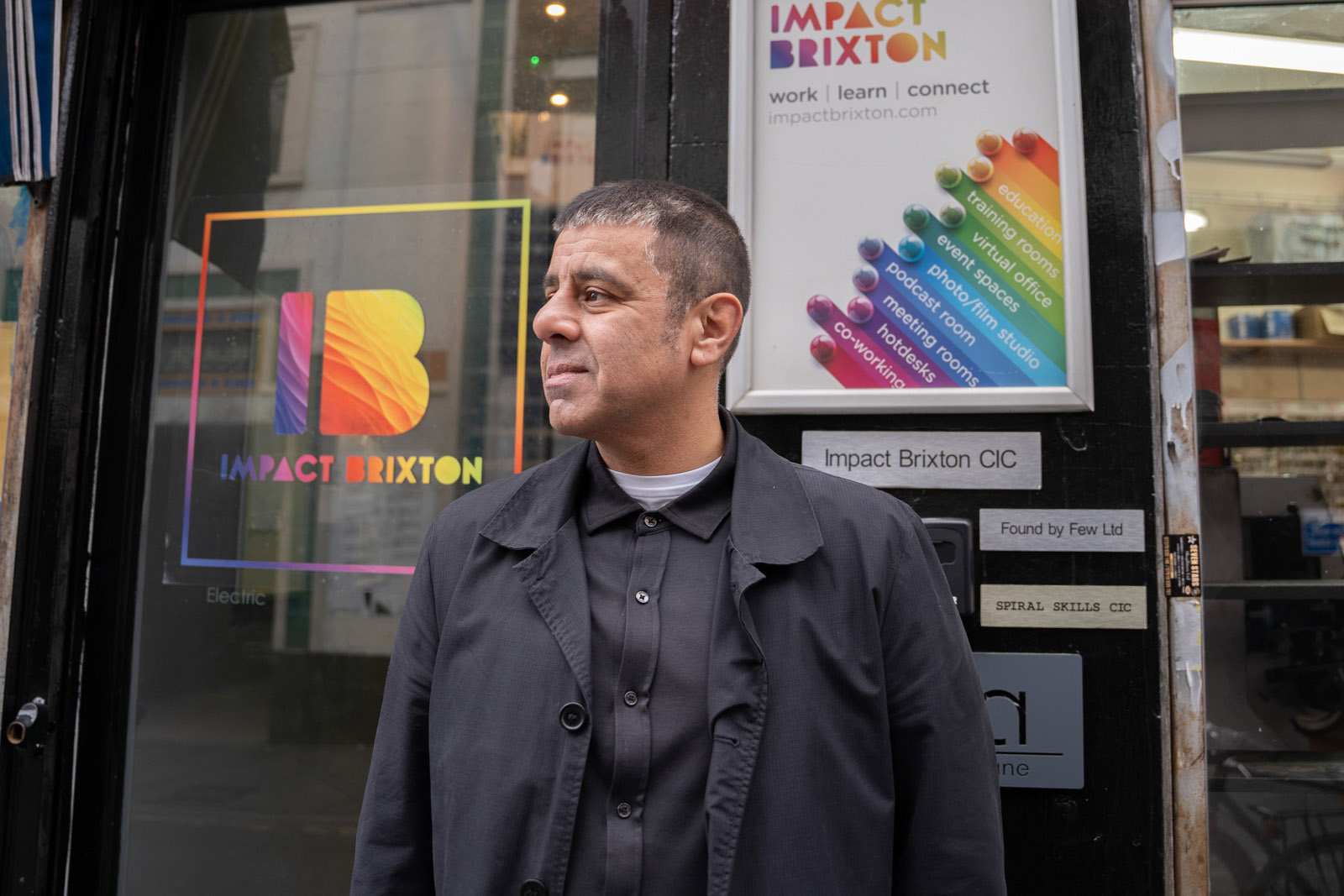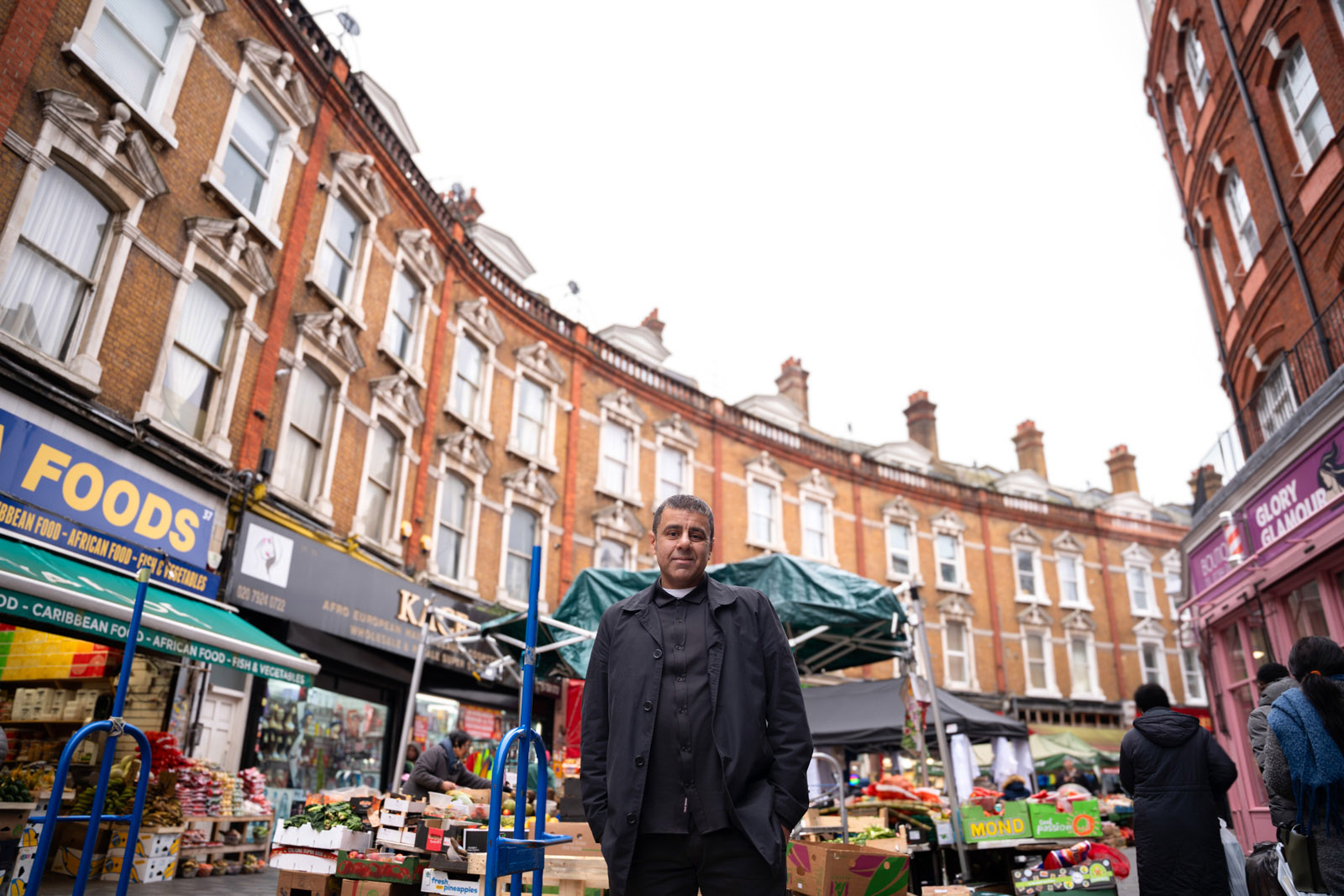‘I’m not interested in destroying institutions, I want to change them’
The founder of a London-based arts and education charity has spent nearly a decade helping inner city Black and Asian students to broaden their horizons
–

Attendance at Stepney All Saints School in east London is down on the day I visit in mid-November. For most of the teenagers, a Free Gaza protest taking place a few streets away, which they have been given permission to attend, is an unmissable draw.
Inside a classroom of predominantly British Bangladeshi teenagers, Anwar Akhtar, the head of a London-based arts and education charity, is about to begin a workshop encouraging more economically excluded Black and Asian students to consider a career in Britain’s cultural and political institutions.
Akhtar, 54, with greying hair, and carrying a limp from an old football injury, talks to the students with the jaunty air of a relatable uncle. He begins by playing a YouTube video of a flash mob orchestra performing Ode to Joy outside a bank in Sabadell in northern Spain.
“This is all about teamwork and the magic of music,” says Akhtar. The performance begins with a cellist performing a solo. He is soon joined by around 30 other musicians, ultimately forming an orchestra as one of Beethoven’s most famous works reaches its peak. Hundreds of members of the public watch on in admiration.
Akhtar asks the four students attending his workshop about their responses to the clip. One or two say they have heard the music before. One boy, who says he doesn’t listen to music for religious reasons, speaks up. “It gave me nostalgia for when I used to play music,” he says. “It gave me joy.”
This is the daily fieldwork that forms Akhtar’s mission to drive social mobility among Black and Asian school and college students. As founder of The Samosa, the arts education charity he founded in 2015, Akhtar helps the students to see themselves as part of Britain’s island story.
“We introduce people to the language of culture, the arts, journalism, nation building, and how the establishment uses those networks,” explains Akhtar. “We bring that to working-class children.”
Akhtar’s mission, which has seen him conduct hundreds of workshops in nearly a dozen UK cities, seeks to equip Black and Asian students with the tools to one day break into the professional echelons of the establishment. One of The Samosa’s key forthcoming school projects involves hosting an event modelled on the BBC’s Question Time. Akhtar hopes a filmed student debate will encourage them to research different issues and adopt unfamiliar perspectives.
He also wants to expose the students to popular Black and Asian role models they can identify with. “Working-class young Muslim girls in the East End, when they hear Mishal Husain speak for the first time or they hear Samira Ahmed speak, that can be very empowering,” says Akhtar. “If you don’t have a culture of listening to Radio 4 or watching Newsnight, then this can be quite transformational.”

Much of Akhtar’s drive comes from his own working-class upbringing. Raised in a religiously observant Muslim family in Manchester — his uncle helped found the city’s Central Mosque — Akhtar grew up in the 1970s and 80s, working on his family’s market stalls.
He developed an interest in arts and culture while attending his social studies degree course at Sheffield University, where he got involved in the local house music scene as a DJ and promoter. After graduating, Akhtar became a lottery projects officer at Arts Council England in 1998 before moving to the London Mayor’s Office as senior culture officer. He was hired as director of the London community arts hub Rich Mix in in 2001, which launched in 2006.
Akhtar became interested in education during visits to Pakistan in the late 2000s. While exploring his heritage, he says he became “obsessed” with Mughal history and the power struggle between the emperor Shah Jahan’s sons — the religiously tolerant Dara and the hardline Aurangzeb — which some historians view as a key moment in the enduring tensions between Muslims, Sikhs and Hindus on the subcontinent.
Akhtar set up The Samosa in 2009 as an online arts and current affairs platform for British Asians. But it was the story of Dara that saw the project expand its mission. After seeing Pakistani playwright Shahid Nadeem’s acclaimed play Dara performed in Lahore, Akhtar realised it would prove popular with UK audiences. He reached out to Nicholas Hytner, director of the National Theatre and the Pakistani theatre company Ajoka. In 2015, with Akhtar acting as consultant, Dara became the first original South Asian production adapted by the National for a British audience.
The play was a critical success and dozens of teachers got in touch asking to screen Dara in their history or politics classes. This led Akhtar to focus his efforts on The Samosa and the education sector, first by creating materials to help diversify curriculums and then through direct teaching. The Samosa was formally established as an arts and education charity in 2015.
One cornerstone of Akhtar’s work involves encouraging students to watch footage of white men such as Boris Johnson and Sir Keir Starmer. “We get young working-class, very bright BME kids in schools like Stepney All Saints sixth form role-playing being a Conservative MP or a Metropolitan police inspector,” he says. “This is really important when you’re growing up in inner-city Tower Hamlets with all the peer and cultural pressures, that you have that wider expanse of knowledge.”
Akhtar grew up in close proximity to white working-class communities in Manchester, but says demographic change means that this kind of intermingling and commonality has become rarer for young Black and Asian people in some parts of the UK. “I think when you’re in an all-BME schooling environment, you don’t get that.”
Informal ethnic segregation in schools is a sensitive issue. Research suggests it has become less prevalent over the past two decades. But nevertheless, figures from the Department for Education show that last year, pupils of Bangladeshi heritage made up at least 70% of the student body at 40 of Tower Hamlets’ 85 state-funded mainstream schools, including 21 where they made up at least 80% of students.
Akhtar told me he once asked some students in Tower Hamlets to name famous people from London’s East End. He says he was bemused by their answers. “None of them knew who Michael Caine was. Getting them to actually look at Michael Caine’s films, you could see their eyes popping as they started to understand the city they came from.”
Nick Charlesworth, head of the sixth form at Highgate Wood School, has worked with Akhtar on The Samosa’s schools material. He told me that one of the charity’s central aims is to instil in young people a sense that cultural capital can include those from similar backgrounds.
“Akhtar was quite clear in his thinking that those cultural capital activities needed to raise aspiration by making young people feel that they could not just watch from the outside, but maybe they could pursue their lives in ways that perhaps they wouldn’t have thought.”
A few days after the session at Stepney All Saints, Akhtar is giving a presentation to a class of around 20 BTEC students at Lilian Baylis Technology School in Lambeth, south London. Akhtar is in his second year of delivering a voluntary weekly course to the mostly Muslim, Somali, African-Caribbean and Turkish students in which they make a short film about a topic of interest to them.
During the workshop, Akhtar gives the students an overview of the fashion industry and explains how “marketing companies are full of middle-class people working out how to take money off working-class teenagers like you”. He tells the students that they’re “being played” by the marketing industry.
Having described corporate marketing in a way that might have hinted at a call for revolution, Akhtar instead emphasises that the students could be the ones in charge instead. “Once you understand these things, you’re on your way to understanding society, power. You want to be the person setting up the business,” he says.
Akhtar’s approach has begun to pay dividends. Last year one of the students landed an internship at the British Film Institute on the back of his advice.
Ojay Hamilton, an English and media teacher at Lilian Baylis Technology School who runs a BTEC course in media studies, says Akhtar’s lived experience is a key factor in his ability to speak to the students: “Through Anwar’s work, what he’s done, I know he had the inside lane, he had the intel that the students needed.”
He adds: “The work that he’s come up with, he’s kept it authentic to his community.”
Akhtar stresses that the workshops are underpinned by his desire to diversify the UK’s professional classes. “I’m not interested in destroying institutions,” he tells me, away from the classroom. “I’m interested in changing institutions.”
Topics
Get the Hyphen weekly
Subscribe to Hyphen’s weekly round-up for insightful reportage, commentary and the latest arts and lifestyle coverage, from across the UK and Europe
This form may not be visible due to adblockers, or JavaScript not being enabled.